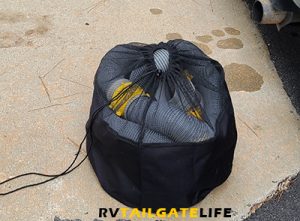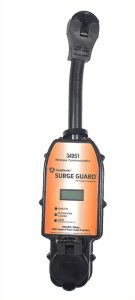Must Have Gear for Your New RV
Recently, my aunt and uncle had an unexpected entry into RV Life. They had a fire at their house that is going to take close to a year to repair. Lucky for them, their insurance adjuster approved them getting an RV to live in on their property during the rebuild instead of living in a hotel or apartment.
They found a nice travel trailer that suits their purposes for a year of stationary living. Once they got it setup on their land with temporary power pole, they had to go about getting their RV ready to live in.
So in their honor, here’s my recommendations for must haves for first time RV owners!
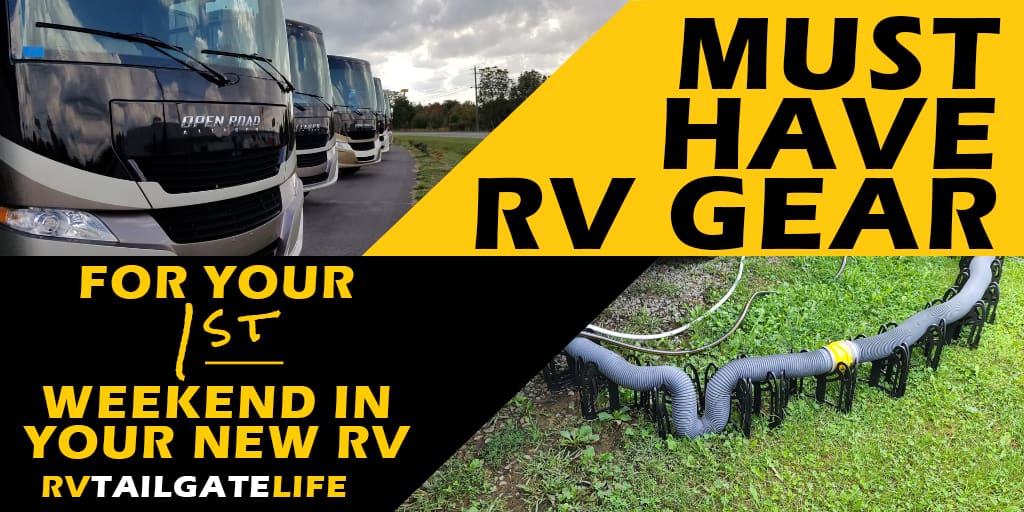
General Advice for New RV Owners
There is a lot of advice out there for new RV owners, especially when it comes to gear. But my advice is probably contrary to most… only buy the absolute minimum when you first get your RV.
With next day shipping from Amazon and same day curb-side pickup from Home Depot and Walmart, you can easily get more stuff later on, as you need it. Plus, for many things, you can go shopping in your own home, especially kitchen gear where you may already have duplicates.
On the other hand, storage space is limited in an RV and who wants to store stuff that they will never use?
So let’s take a look at what you need for that first weekend in your RV.
See Also: A Guide to Common RV Abbreviations and Slang
The Absolute Must Have RV Products
Sewer hoses
One of the biggest issues with RVs is the sewer system. And how you get rid of the waste. That’s where sewer hoses come in.

Some RVs may come with sewer hoses. But often these sewer hoses are ridiculously thin or may not even have connectors on the end!
For under $50, you can get a good quality RV sewer hose kit that includes two 10 foot long sewer hoses, connectors to connect the sewer hoses together and to the RV and a clear elbow adapter to connect to the sewer hookup.
Most RVers are going to be fine with just 20 feet of sewer hose. On occasion, you may find that you have a dump station or hookup just a little further away. In that case, you’ll probably want to add a couple more sections of hose. I would stick with the 10 feet long sections since they are easily stored and connected together.
You’ll probably also want somewhere to store the sewer hoses (and fresh hoses, and electrical cords, and all the other stuff). I highly recommend RV hose storage bags. The sewer or black water bags easily hold 4 10 foot sections and a variety of elbow adapters. They are much easier to get into basement storage over the hard-sided plastic container I was using before.
Fresh water hose
Fill her up! With fresh water.
You’ll want a water hose that is dedicated to only potable water, so you don’t cross-contaminate with waste water. Because eeewww! and potentially dangerous.
To make it easy to keep track of what is what, get a white hose which are typically safe for potable water. And this way, your RV neighbors aren’t silently judging you. 25 feet of hose is normally enough and still easy enough to store. As you RV, you may find you need more, but I recommend connecting multiple fresh water hoses together rather than going with a 50 or 100 foot hose. The longer lengths are just too bulky and hard to handle for the few times you’ll need them.
You can then use a standard garden hose for the black tank rinse, washing the exterior of the RV, or other purposes.
See Also: How to Sanitize the RV Fresh Water System
Electrical Management System (RV Surge Protectors)
One of the big pricey things that I recommend that all RV owners have is a special RV electrical management system. This is like a fancy RV surge protector that does way more than protect against power surges. I mean, it does that too, but more.
Like miswired power pedestals, low and high voltage, and of course surges. Get one that fits your RV power: 50 Amp Total Electrical Protection or 30 Amp Total Electrical Protection.
And while these may seem pricey up-front, they won’t if you ever need them!
First Aid Kit
Safety first! Just like your home and cars need a first aid kit, so does your RV. From bumps and bruises to more serious sprains and deep lacerations, basic first aid is important. Especially when you might be RVing outside of easy access to urgent care. And who wants the deductible for a visit, right?
Read More: Yes, You Need a First Aid Kit in the RV
Emergency Roadside Kit
Again, with the safety. You would have at least a few basics in your car, so why not your RV? This is especially true for motorhomes, when you may not be towing a car. Jumper cables and road reflectors are mandatory.
Being able to change an RV tire? You may just want to call roadside assistance for that one. But those reflectors or flashers can be great to warn off other motorists while you wait.
Basic Living Accessories
For your first night in your RV, you are going to want a few basics – sheets and pillows for the bed, blanket or comforter and probably some towels for your shower. The first couple of nights you’ll probably want to spend eating out, but if you are going to be cooking, you’ll need the basic kitchen setup.
Here, I suggest you go minimal until you know what you want. Or what your RV comes with – hello scratchy comforter provided by Tiffin. But it is also about color schemes and the decorating part – wait until you see what the colors are going to be.
In the meantime, just bring the basics from home.
When you are ready, here are the kitchen accessories that I recommend for your RV kitchen.
Toilet Paper

In the “basic living necessities” you are going to need toilet paper. There is a big debate over RV toilet paper – do yo need it or not?
I’ll start by saying that I have never used RV specific toilet paper in my RV. I am not a fan of 1 ply tissue and it doesn’t even tend to be “ultra soft” no matter what they claim.
I also have found that RV toilet tissue is generally more expensive than regular septic-safe toilet paper. I can buy that at Costco and get enough for the RV and the house at the same time!
Use plenty of water and black tank bombs and you won’t have a problem!
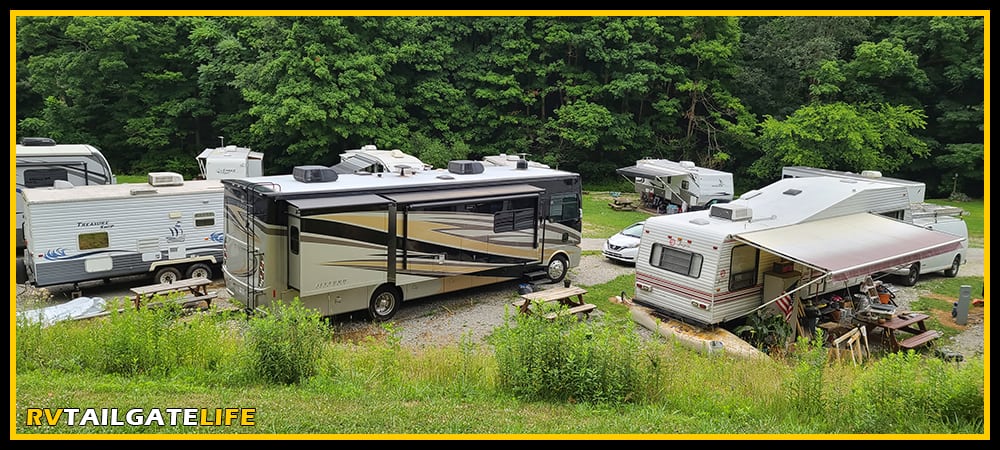
Good RV Insurance
You have just bought a something with a pretty hefty price tag. Now you need to insure it.
This will absolutely be required for any motorhome to be able to legally drive it (state required minimum insurance for any motor vehicles). It will also be required if you take a loan out to purchase your RV.
It is highly adviseable that you buy more than the minimums, to make sure that you are fully insured in case something happens. It’s complicated, so be sure to read about RV Insurance Explained Before You Shop.
The Nice to Haves
As you start RVing more, especially as you travel around, you’ll find that there are some things that are nice to have.
Water filters
When I started RVing, I was doing mostly weekend trips to sporting events where I would be boondocking. I would fill up my freshwater tanks at home where I had a dependable, clean water source without a lot of contaminants – I could drink water out of my home faucet. The water filters weren’t a requirement.
As a I started traveling more and for longer periods, I was getting water from campgrounds that didn’t always have the best water. That meant I needed water filters to help make the water more suitable – for taste and to prevent hard water issues.
Water Pressure Regulator

When I’m at home filling up my tanks, I typically rely on the gravity fill. It’s just easier mostly because it is on the passenger side which is closer to my hose.
But when I’m using the “city water” connections at campgrounds, I want to make sure that the water is coming in at a pressure that won’t damage the pipes or connections. That’s where the RV water pressure regulator is helpful!
These regulators make sure that the water is not coming in at too high a water pressure, which could damage your pipes.
Power Adapters
My first RV was a 30 amp RV that I plugged in at home (120v) between trips. So this was up there in the first things I bought. But for many people that don’t plug their RVs in, having a wide selection of power adapters may be unnecessary.
Common power adapters that RVers need include:
- 50 amp female to 15 amp male to plug a 50 amp RV into standard three plug home outlet
- 50 amp female to 30 amp male to plug a 50 amp RV into a 30 amp cord or outlet
- 30 amp female to 15 amp male to plug a 30 amp RV into standard three plug home outlet.
- 30 amp female to 50 amp male to plug a 30 amp RV into a 50 amp cord or outlet
Sewer Hose Supports

Some RV campgrounds with full hookups require that the sewer hoses be off the ground. Or you may need the help to create a nice slope for gravity to assist with the dumping process. Either way, you’ll probably find that sewer hose supports are good if you stay in a full hookup campground.
I don’t include these on the absolute must haves because not all RVers need them. If you are staying in partial hookups or boondocking, then the supports are likely not necessary. Many campgrounds don’t need or require them. So you can probably wait until later to buy this.
Tire Pressure Monitoring System and Inflators
If you are going to be traveling in your RV and not just staying stationary, then you need to check on your tires before you go.
Many people are comfortable with using a tire pressure gauge before they leave on their trips and then checking at their stops for gas, food, or sleeping. Make sure you get one that reads high enough for the recommended PSI for your tires – big rigs go over 100 psi and many standard car tire gauges don’t go over about 60.
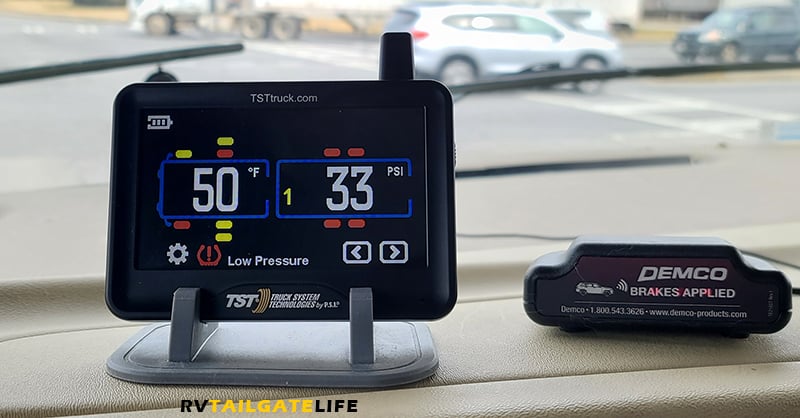
Other people want to know how their tires are doing while they are underway. This is especially important if you are towing (either as your truck is towing a trailer or your motorhome is towing a vehicle), as you may not be able to “feel” what is going on behind you. That’s where a Tire Pressure Monitoring System (TPMS) comes in. Again, make sure your system is rated for the PSI for your tires (the cheap systems only go to 99 PSI and aren’t suitable for big rigs).
Tire Inflators
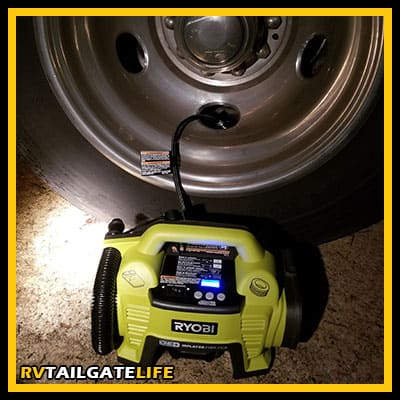
Another thing I learned the hard way on my big rig – the gas station air isn’t going to inflate the tires on your big rig. Neither will that Ryobi battery powered inflator (I’ve tried). You’ll need an inflator that is rated for your tires!
I’ve got an old Black & Decker Air Station workhorse straight out of the 90s that I “inherited” from my parents. OK, I borrowed it with no intention of returning it after I found out it works on my RV. I left them with the Ryobi for their cars, so it’s all good.
But if you need to buy something today, the VIAIR inflators are top-notch and I highly recommend!
Outdoor Living Accessories
The best part of RV living is the time we spend outside. So while they are not the absolutely-gotta have to not totally fail at RVing, outdoor living accessories are pretty key to enjoying the RV lifestyle.
At a minimum, you are going to want some camping chairs to sit outside in. Many RV parks have picnic tables and fire rings at your camp site, but not all of them. So you may want to add a portable folding camping table to eat at or serve up food and a propane fire pit for when there are burn bans (often propane fires are still allowed during burn bans).
Once you get past the few basics that you just have to have, you can go pretty crazy. Flags, rugs, tents, you get the idea…
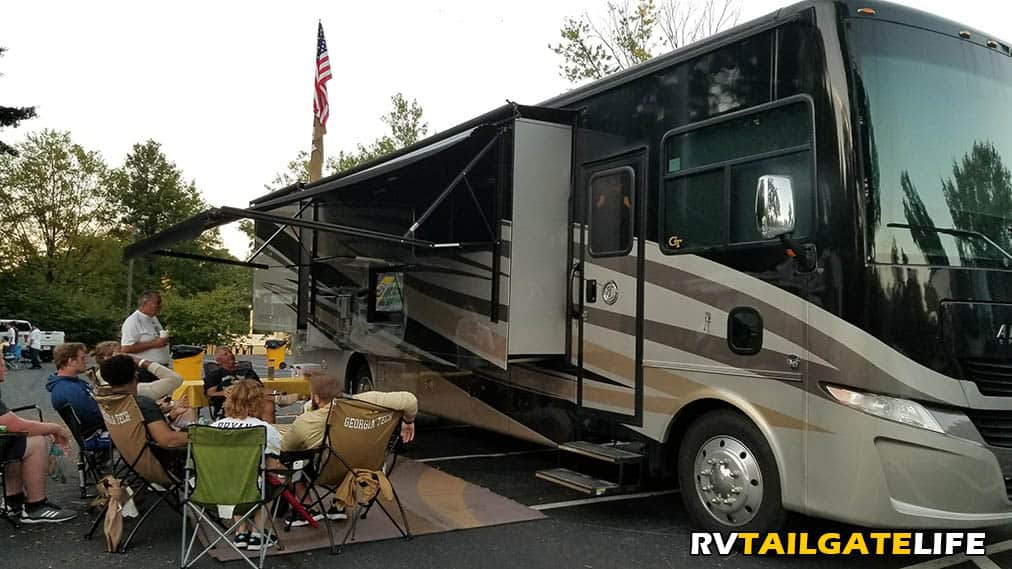
RV Gear to Wait Until You Just Have to Have It
On many RV gear lists, you’ll find a lot of things for a fully outfitted RV. But many RVers never use these things. So wait until you know that you have to have it.
RV Portable Sewer Tanks

Portable sewer tanks are great when you are staying in one place for a long time and you don’t have a full hookup that includes sewer. But I’m already 7 years into RVing and haven’t needed one yet.
That being said, my aunt and uncle that are doing the stationary RV living on their property needed it from day 1 because while they have convenient water and power, not so much on the sewer dump.
Depending on your setup and needs, a RV macerator pump may also be a good choice instead of the portable tank. You can pump the waste slightly uphill and over a pretty long distance through a standard garden hose to a sewer or septic clean-out. Many people don’t need both the portable tank and the macerator pump, so you can wait to figure it out.
Mattress Toppers or New Mattresses
RVs are notorious for bad mattresses. But I recommend that you wait until you have your RV and spend a few nights in it before you go out buying a new mattress.
First, you may buy an RV with a pretty decent mattress in it already. My first one was pretty comfortable because I bought it used and they had replaced the RV mattress with a comfy residential mattress. And it wasn’t even an RV short mattress which meant my sheets from home worked on it! Win-win!
Then, when I upgraded, oh my. The upgraded foam mattress left much to be desired. I didn’t know this until I had slept on it a few nights. But it was fixed with a nice mattress topper from Amazon.
Generator Exhaust System
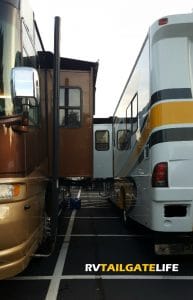
First, you won’t need this unless you have an onboard generator to power your RV. But if you do, especially if you spend time boondocking or tailgating, you’ll eventually need an RV generator exhaust system.
These can be homemade or you can buy a system pre-made. The important thing is that they are tall enough to take the generator exhaust up and over your RV.
This helps to protect you and your neighbors from the potential deadly effects of carbon monoxide.
Read more: GenTuri RV Generator Exhaust System
Must Have RV Gear for Your First Weekend Trip

You can go crazy buying gear for your RV. But you may regret it later on, when you have all this stuff and nowhere to store it.
That’s why I recommend that you start with the smallest amount of stuff and then only add what you need as you go.
Like these recommendations? Pin for later!
You May Also Like:
11 Tips the New RVer Should Know
7 Common RV Mistakes to Avoid
RVing in Severe Weather

